


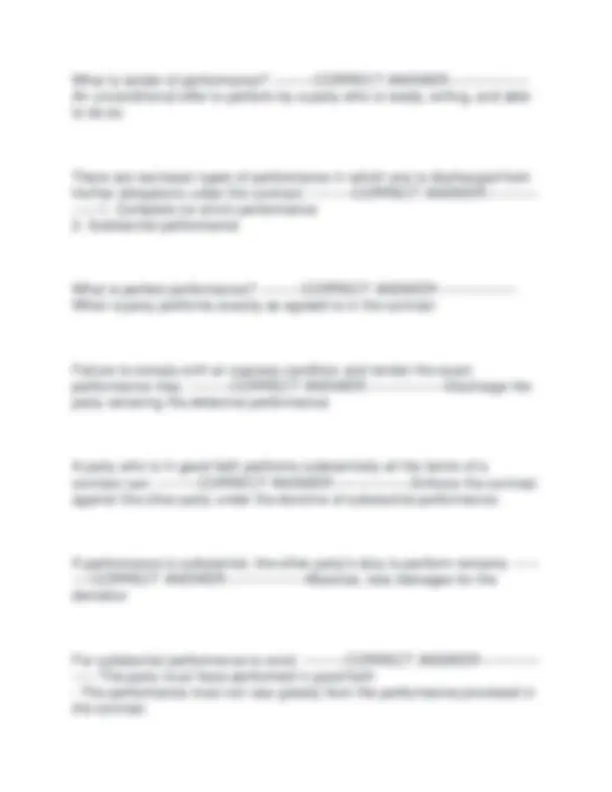
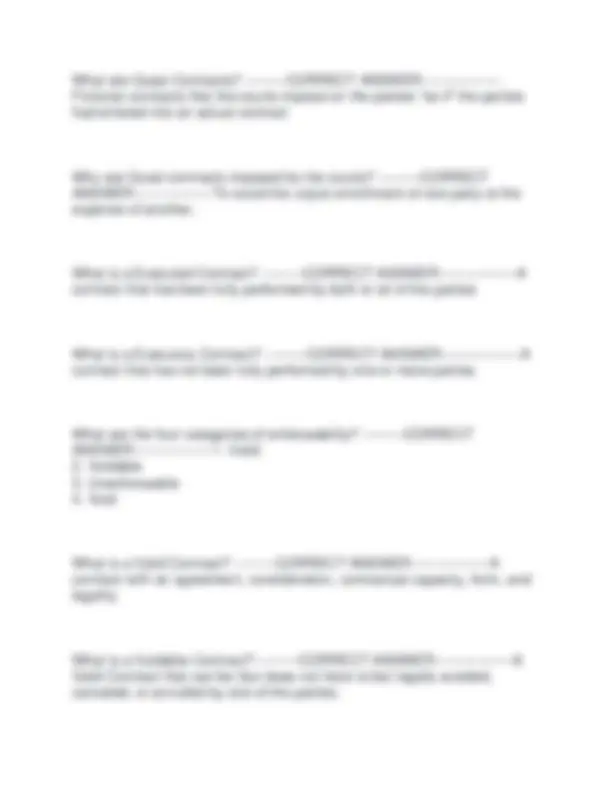
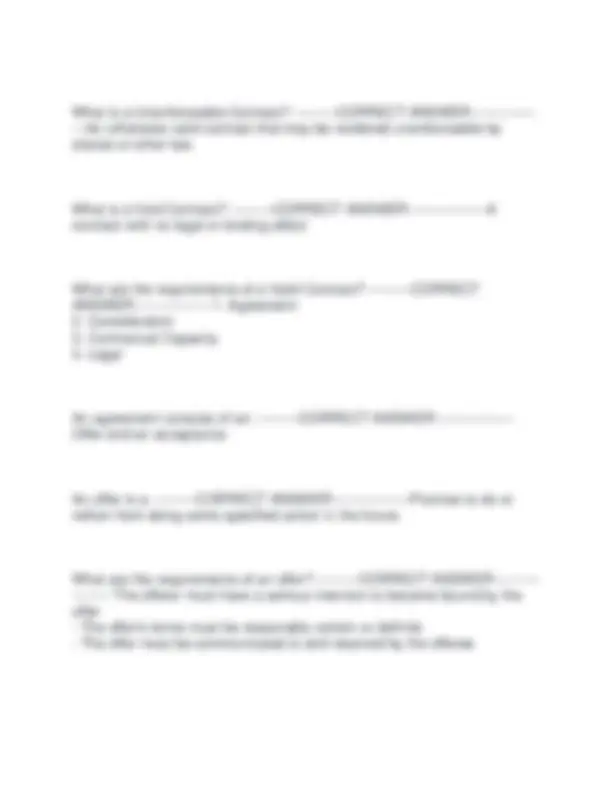

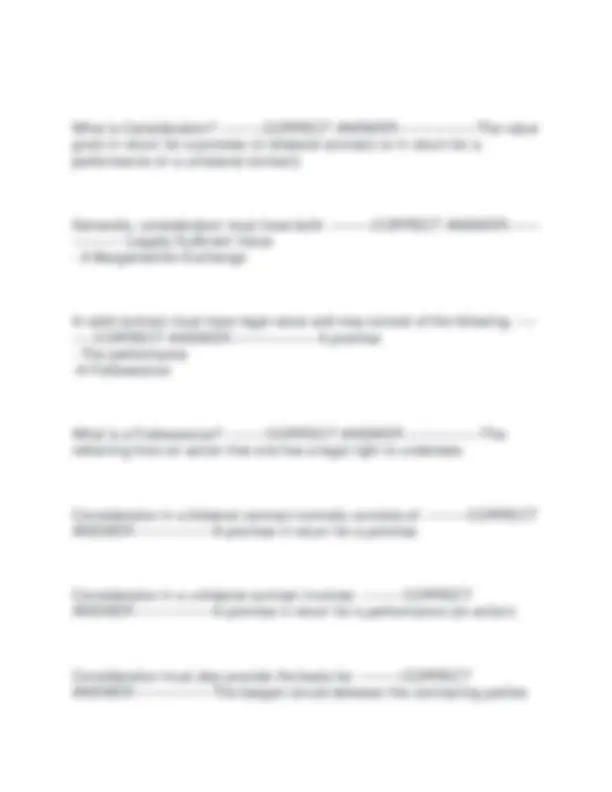
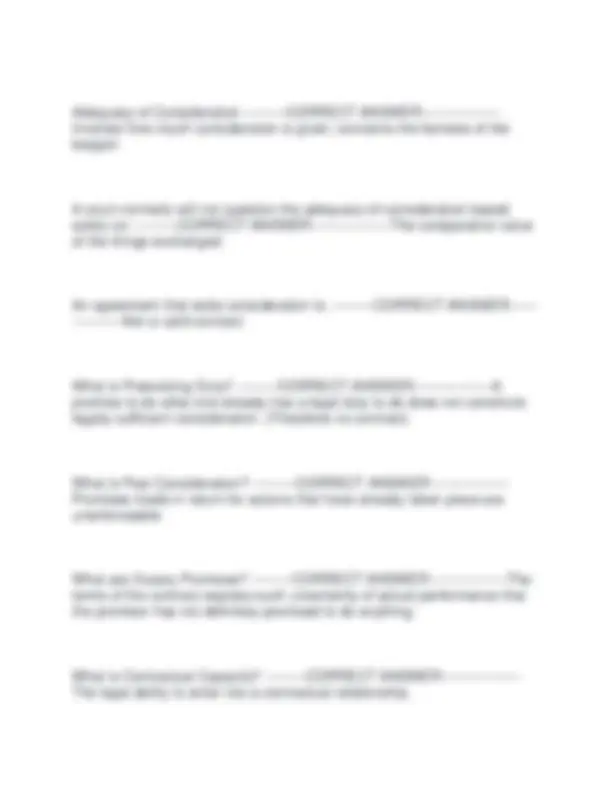
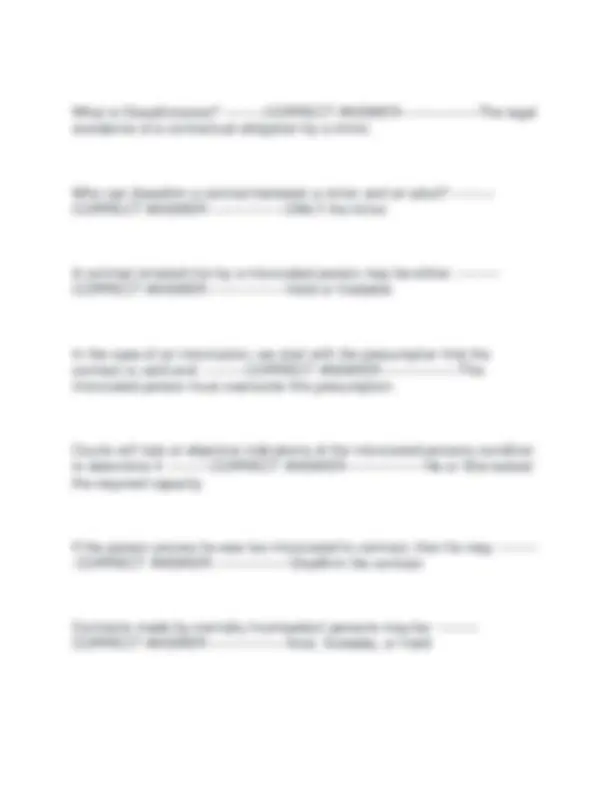
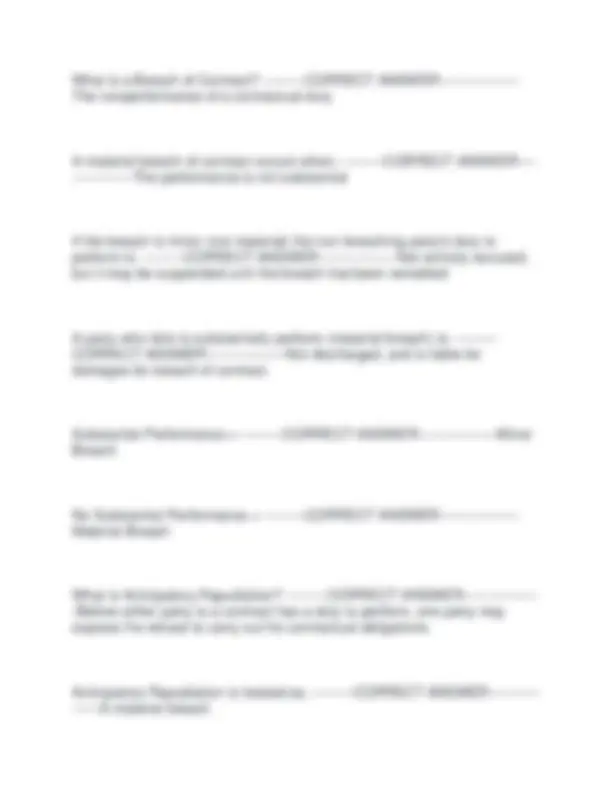

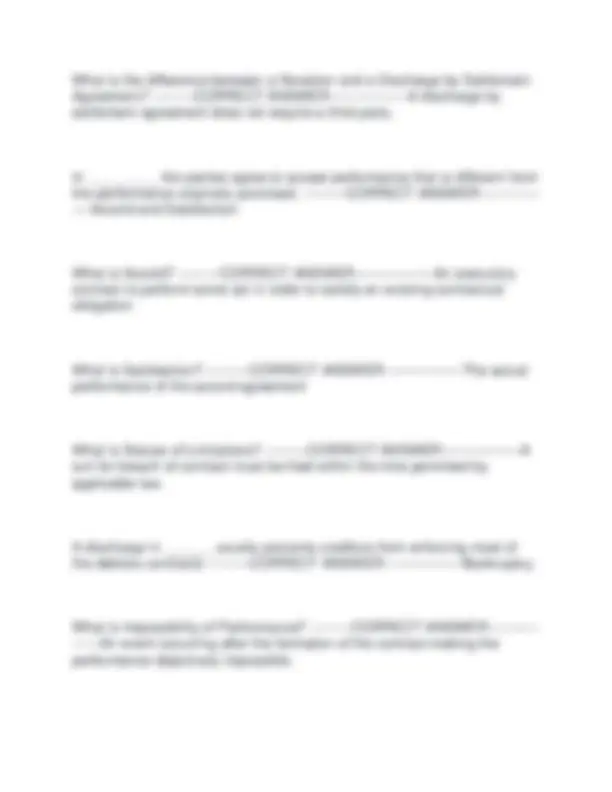
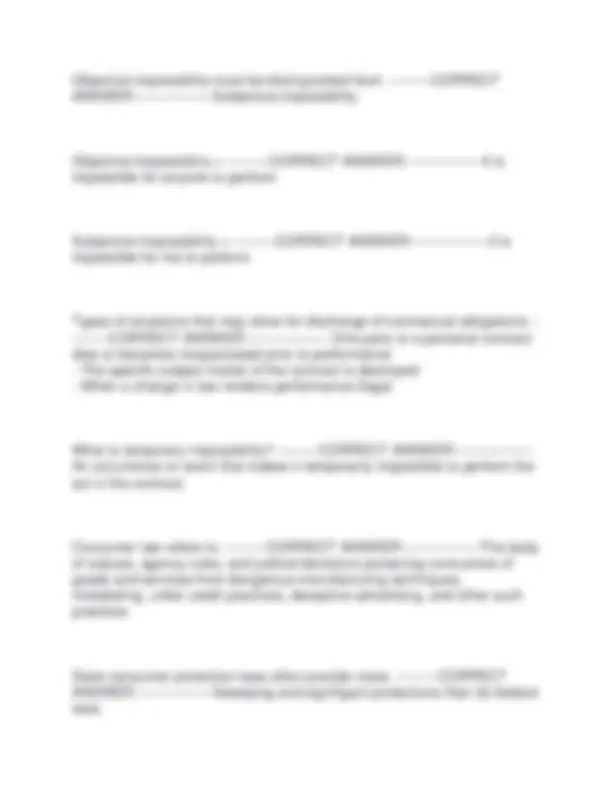
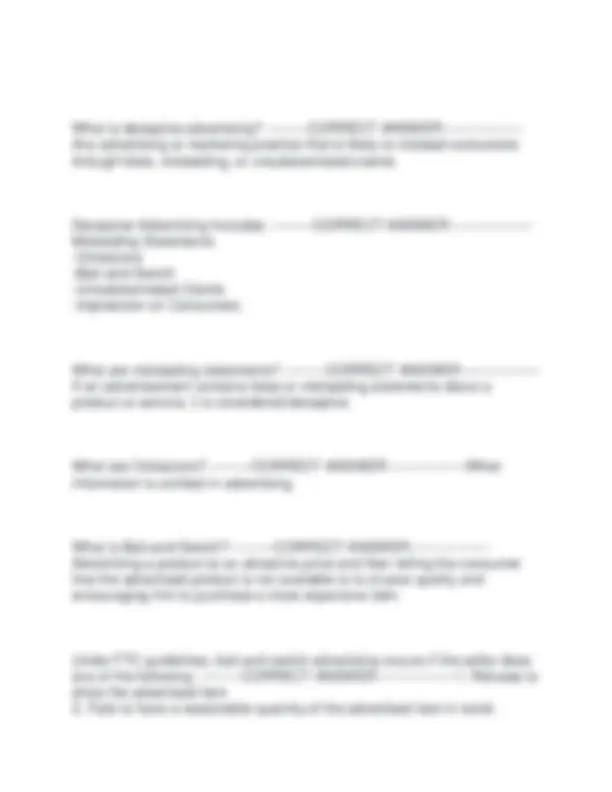
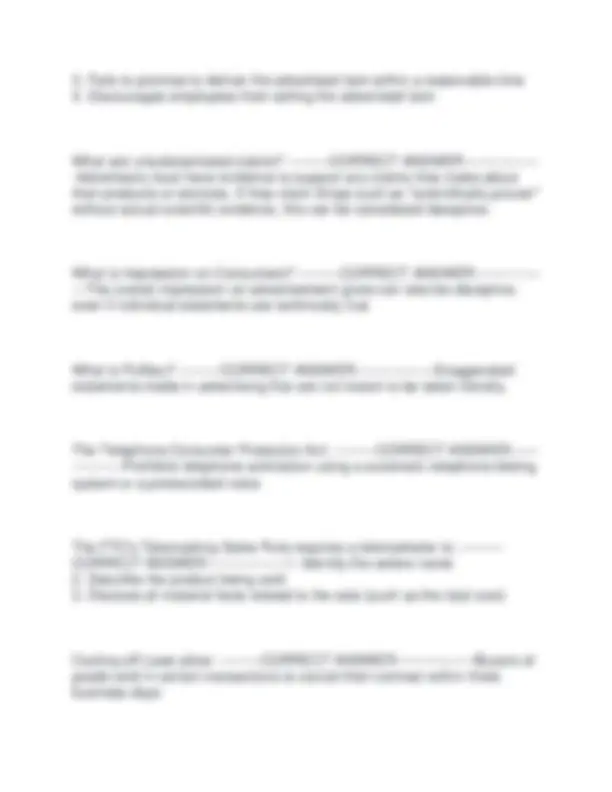
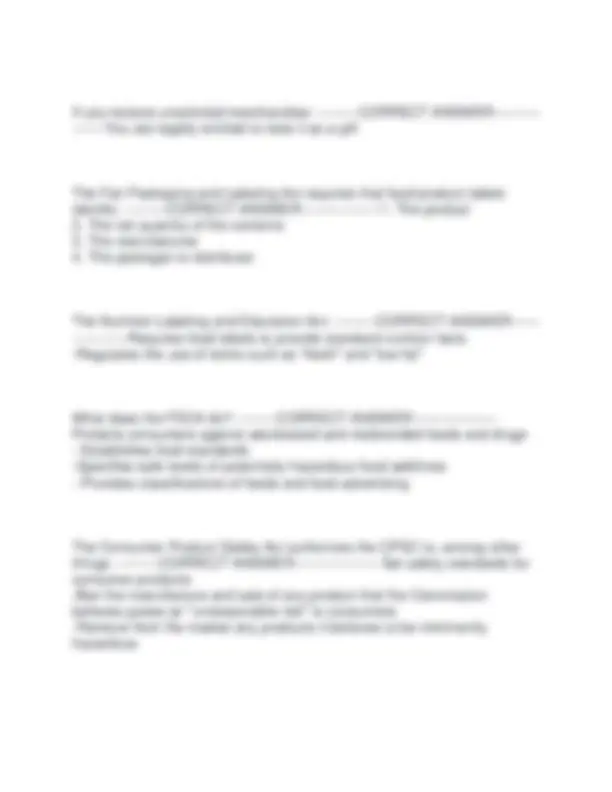



Study with the several resources on Docsity

Earn points by helping other students or get them with a premium plan


Prepare for your exams
Study with the several resources on Docsity

Earn points to download
Earn points by helping other students or get them with a premium plan
Community
Ask the community for help and clear up your study doubts
Discover the best universities in your country according to Docsity users
Free resources
Download our free guides on studying techniques, anxiety management strategies, and thesis advice from Docsity tutors
A comprehensive set of questions and answers covering key concepts in contract law, including mistakes of fact, fraudulent misrepresentation, undue influence, duress, conditions, performance, and the elements of a valid contract. It is a valuable resource for students studying business law or contract law, offering insights into common legal issues and principles.
Typology: Exams
1 / 25

This page cannot be seen from the preview
Don't miss anything!


















A mistake of fact occurs when: ---------CORRECT ANSWER----------------- The parties entered into a contract with different understandings of one or more material facts relating to the contracts performance. What is a Unilateral Mistake of Fact? ---------CORRECT ANSWER------------ -----A mistake made by only one of the parties does not generally give the mistaken party any right to relief from the contract. What is a Bilateral (mutual) Mistake? ---------CORRECT ANSWER------------ -----A mistake by both contracting parties about one or more material facts. In this case, either party may rescind the contract since both parties are mistaken about the same material fact. What is a mistake of future value? ---------CORRECT ANSWER----------------
Fraudulent Misrepresentation consists of the following elements: --------- CORRECT ANSWER------------------ a misrepresentation of a material fact must occur
The most common way to discharge ones contractual duties is by: --------- CORRECT ANSWER-----------------Performance of his duties What is a condition? ---------CORRECT ANSWER-----------------A qualification in a contract based on a possible future event The occurance (or non occurence) of the event will: ---------CORRECT ANSWER-----------------Trigger the performance of a legal obligation - or terminate an existing obligation under a contract If the condition is not satisfied: ---------CORRECT ANSWER----------------- The obligations of the parties are discharged Three types of conditions can be present in contracts: ---------CORRECT ANSWER-----------------1. Conditions Precedent
What is tender of performance? ---------CORRECT ANSWER----------------- An unconditional offer to perform by a party who is ready, willing, and able to do so. There are two basic types of performance in which one is discharged from his/her obligations under the contract: ---------CORRECT ANSWER----------- ------1. Complete (or strict) performance
What is a offeror? ---------CORRECT ANSWER-----------------The party making the offer to form a contract What is the offeree? ---------CORRECT ANSWER-----------------The party to whom the offer is made. If the offeree can accept an offer simply by promising to perform, the contract is a: ---------CORRECT ANSWER-----------------Bilateral Contract If the offer is phrased so that the offeree can accept only be actual performance (not by a promise to perform) the contract is a: --------- CORRECT ANSWER-----------------Unilateral Contract What is a Express Contract? ---------CORRECT ANSWER----------------- When the terms of the agreement (whether oral or written) are explicitly stated. What is a Implied Contract? ---------CORRECT ANSWER----------------- When the parties conduct create and define the terms of the contract. Implied contracts are typically formed when: ---------CORRECT ANSWER--- --------------1. The plaintiff furnished some goods or services
What are Quasi Contracts? ---------CORRECT ANSWER----------------- Fictional contracts that the courts impose on the parties "as if" the parties had entered into an actual contract Why are Quasi contracts imposed by the courts? ---------CORRECT ANSWER-----------------To avoid the unjust enrichment of one party at the expense of another. What is a Executed Contract? ---------CORRECT ANSWER-----------------A contract that has been fully performed by both or all of the parties What is a Executory Contract? ---------CORRECT ANSWER-----------------A contract that has not been fully performed by one or more parties. What are the four categories of enforceability? ---------CORRECT ANSWER-----------------1. Valid
What is Intention? ---------CORRECT ANSWER-----------------Judged by what a reasonable person in the offeree's position would conclude about the offer. These statements are generally not considered offers because the necessary intent is usually lacking: ---------CORRECT ANSWER--------------- --- Expressions of opinion
What is Revocation? ---------CORRECT ANSWER-----------------The offerors act of withdrawing an offer What is Traditional View of Revocation? ---------CORRECT ANSWER-------- ---------Revocation is permissible until full performance by the offeree What is the Modern View of Revocation? ---------CORRECT ANSWER------- ----------No revocation once performance has been substantially undertaken. What is a counteroffer? ---------CORRECT ANSWER-----------------A rejection of the original offer by the offeree and the simultaneous making of a new offer by the offeree In addition to the specific actions by the parties, an offer can also be terminated by: ---------CORRECT ANSWER-----------------Operation of Law What are the terminations of an Offer by operation of law? --------- CORRECT ANSWER-----------------1. Lapse of Time
What is Consideration? ---------CORRECT ANSWER-----------------The value given in return for a promise (in bilateral contract) or in return for a performance (in a unilateral contract) Generally, consideration must have both: ---------CORRECT ANSWER------- ----------- Legally Sufficient Value
Adequacy of Consideration ---------CORRECT ANSWER----------------- Involves how much consideration is given; concerns the fairness of the bargain A court normally will not question the adequacy of consideration based solely on: ---------CORRECT ANSWER-----------------The comparative value of the things exchanged. An agreement that lacks consideration is: ---------CORRECT ANSWER------ -----------Not a valid contract What is Preexisting Duty? ---------CORRECT ANSWER-----------------A promise to do what one already has a legal duty to do does not constitute legally sufficient consideration. (Therefore no contract) What is Past Consideration? ---------CORRECT ANSWER----------------- Promises made in return for actions that have already taken place are unenforceable What are Illusory Promises? ---------CORRECT ANSWER-----------------The terms of the contract express such uncertainty of actual performance that the promisor has not definitely promised to do anything. What is Contractual Capacity? ---------CORRECT ANSWER----------------- The legal ability to enter into a contractual relationship.
If a court has previously determined a person to be mentally incompetent, any contract made by that person is: ---------CORRECT ANSWER------------- ----Automatically Void A party who has NOT been previously determined to be mentally incompetent by court may disaffirm a contract if at the time of the contracting that person: ---------CORRECT ANSWER-----------------1. Did not know he was entering into a contract
What are Contracts in Restraint of Trade? ---------CORRECT ANSWER------ -----------If two or more parties enter into an agreement not to compete against each other and their only objective is to restrict competition, the agreement is void. What does in pari delicto mean? ---------CORRECT ANSWER----------------- Equally at fault What contracts must be in writing and signed in order to be enforceable? --- ------CORRECT ANSWER------------------ Contracts involving interests in land
If no time is stated in the contract: ---------CORRECT ANSWER----------------
What is the difference between a Novation and a Discharge by Settlement Agreement? ---------CORRECT ANSWER-----------------A discharge by settlement agreement does not require a third party. In _________ the parties agree to accept performance that is different from the performance originally promised. ---------CORRECT ANSWER------------- ----Accord and Satisfaction What is Accord? ---------CORRECT ANSWER-----------------An executory contract to perform some act in order to satisfy an existing contractual obligation. What is Satisfaction? ---------CORRECT ANSWER-----------------The actual performance of the accord agreement What is Statute of Limitations? ---------CORRECT ANSWER-----------------A suit for breach of contract must be filed within the time permitted by applicable law. A discharge in ______ usually prevents creditors from enforcing most of the debtors contracts ---------CORRECT ANSWER-----------------Bankruptcy What is Impossibility of Performance? ---------CORRECT ANSWER----------- ------An event occurring after the formation of the contract making the performance objectively impossible.